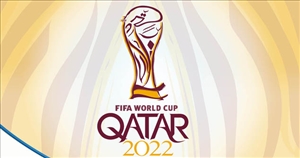By Andrew Warshaw
February 24 – The first ever winter World Cup became a virtual certainty today with a recommendation to stage the 2022 Qatar tournament in November and December, ending decades of tradition.
As expected, the FIFA-appointed Task Force that has spent 18 months exploring the best possible option to avoid the searing Gulf summer heat concluded its final session with a proposal to play the 2022 event in winter though no final ruling will be made until FIFA’s executive committee meets on March 19 and 20.
Despite fierce opposition from Europe’s clubs and leagues, who tabled a detailed compromise of a May 5-June 4 World Cup which they said would cause minimum disruption, their case fell on deaf ears as supporters of a winter tournament – including FIFA and all six of its confederations – won the day.
Following the last Task Force meeting in November, FIFA secretary general Jerome Valcke said the alternative winter period of January/February was still in the running.
But only hours before today’s session, the Task Force’s chairman, Asian Football Confederation chief Sheikh Salman Ebrahim bin Khalifa, who had already previously declared that winter was a done deal, ruled January-February out by making clear November-December was the only viable option to avoid a potential clash with the annual winter sports timetable, especially the winter Olympics.
“All parties have to compromise, not just the Europeans,” Sheikh Salman said on the eve of the final multi-stakeholder summit in Doha.
In the end, however, it was Europe’s clubs and leagues who had to give the most ground without the support of UEFA whose president Michel Platini first raised the idea of a winter World Cup even though his own Champions League and Europa League competitions will have to face some rescheduling, and clubs and leagues within his constituency were aggressively united in opposition.
FIFA issued a statement confirming the Task Force’s recommendation and explaining the rationale behind it.
It said a number of options had been discussed but concluded that November-December was the best one for a number of reasons. Among these were that the 2022 Winter Olympics could be staged from February 4-20; the month of Ramadan begins on April 2 ruling out a spring World Cup; and consistently hot conditions prevail from May to September.
“The only remaining effective option is the November/December window,” the statement said, adding crucially that all six confederations supported the idea.
A statement from UEFA supporting the recommendation said: “UEFA believes that – for the benefits of players and fans – the event should be played in winter…UEFA sees no major issues in rescheduling its competitions for the 2022/23 season, should the 2022 FIFA World Cup proposal be approved by the FIFA Executive Committee, and UEFA acknowledges that the competition may be shortened and thus that the release period of players be reduced.”
Although exact dates are still to be worked out, the prospect of the World Cup finishing just before Christmas will be hard to digest for the entire football community. So will the apparent idea of shortening the competition to cause the least possible disorder to the global calendar.
Then there is the problem of the Confederations Cup, the traditional warm-up tournament that takes place the year before the World Cup. FIFA’s statement said the Task Force was exploring the idea staging it in another Asian country during its traditional June-July window with the Club World Cup instead possibly relocated to Qatar to serve as a replacement test event in November/December 2021.
It was also agreed that in order to finalise the international match calendar for the 2018-2024 period, the Task Force will reconvene once the FIFA Executive Committee has given the green light to November-December at next month’s meeting in Zurich, a session that is certain to generate huge media interest.
Sheikh Salman himself insisted the best compromise solution had been reached.
“It was a challenging task and I want to thank all members of the football community for their productive input and constructiveness in helping to find a solution that we believe can work for everyone,” he said.
But despite his attempt to steer a diplomatic path, the move will infuriate the clubs and leagues who now have to swallow the prospect of splitting their regular season in half and who passionately believed their May option would have been perfectly workable and cool enough for both players and fans.
The European Clubs’ Association, representing some 200 clubs, and the European Professional Football Leagues, which covers 24 countries, both had representatives at the meeting but their arguments for keeping the tournament as close to summer as possible were rejected even though the Qatari organisers have been at great pains to develop revolutionary cooling techniques.
The mood among supporters of a switch is that the tournament should be played in the best climatic conditions when it goes to fresh territories and that there is plenty of time to make the necessary calendar adjustments. But the counter-argument is that it should simply not have taken over four years to get to this point.
Contact the writer of this story at moc.l1741243666labto1741243666ofdlr1741243666owedi1741243666sni@w1741243666ahsra1741243666w.wer1741243666dna1741243666

